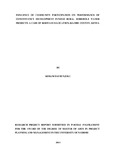| dc.description.abstract | Community water projects in Kerwa sub-location play a significant role in provision of
water for domestic use and small-scale farming. The area is generally characterized by lack
of significant amount of surface water. This condition has lead various stakeholders such as
the government through the Constituency Development Fund, donors and the local
community to pull resources together in an effort to provide safe and clean water to the
residents by establishing community borehole water projects. However, some of the water
projects had not performed up to the expectations of the residents at the time of the study.
The purpose of the study was to investigate the influence of community participation on
performance of Constituency Development Funded rural borehole water projects in Kerwa
sub-location, Kiambu County, Kenya. The objectives of the study centered on the following
issues in regard to the performance of CDF funded water projects in Kerwa; the influence of
Community Participation in Financial management, participation in project Governance,
participation in Operation and Maintenance and participation in Monitoring and Evaluation.
Descriptive survey research design was employed in the study, where questionnaires were
administered to household representatives and management committee members
interviewed. The data collected from questionnaires was coded, cleaned and analyzed using
descriptive data analysis and cross tabulation in order to generate mean, frequency tables
and percentages. Purposive sampling procedure was applied to select Podo and Nyakianda
water projects out of the five CDF funded community borehole water projects based on
their homogeneity at the time of the study. The target population of the study was 238 and it
consisted of 220 household representatives and 18 management committee members from
Nyakianda and Podo water projects. Simple random sampling technique was applied to
select 66 household representatives and 6 management committee members from the two
water projects. The findings of the study revealed that where Community Participation in
Financial management, Governance, Operation & Maintenance and Monitoring &
Evaluation of community water projects was high, the performance of the projects in terms
of effectiveness and efficiency, functionality, sustainability and improvement of livelihood
was high and vice versa. It was therefore inferred that the high ranking of performance of
Podo water project was linked to the high level of Community Participation in the identified
parameters. On the other hand, the low ranking of performance of Nyakianda water project
was allied to the low level of community participation. Some of the recommendations made
for the study include the need for training and capacity building programmes to sensitize the
community to actively participate in community water projects. | en_US |

